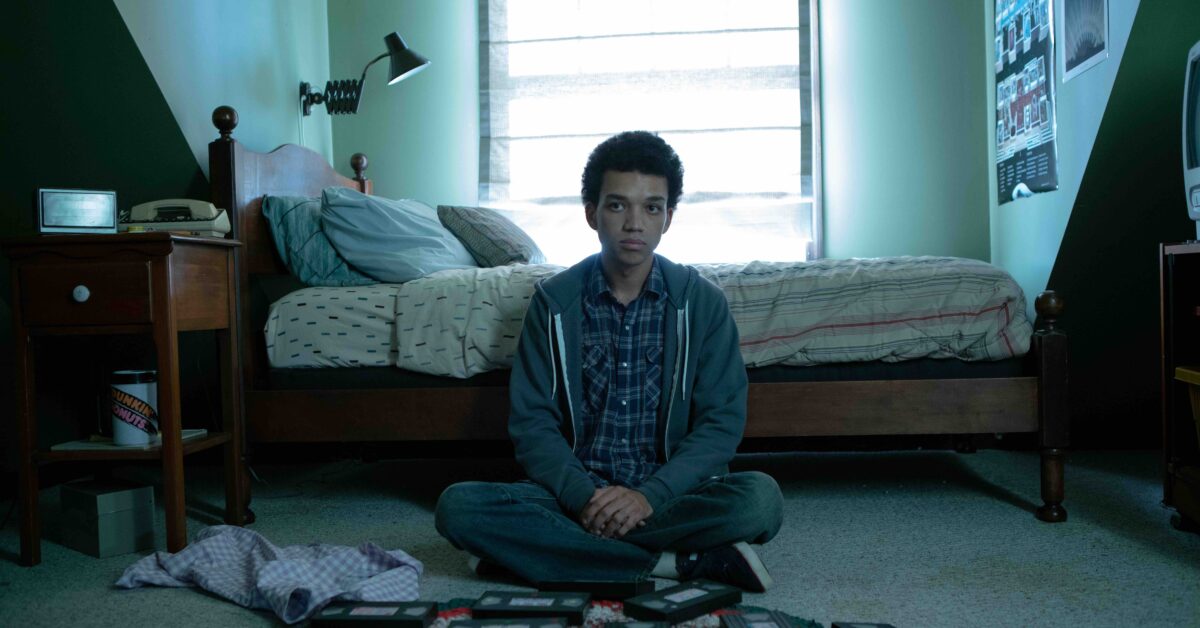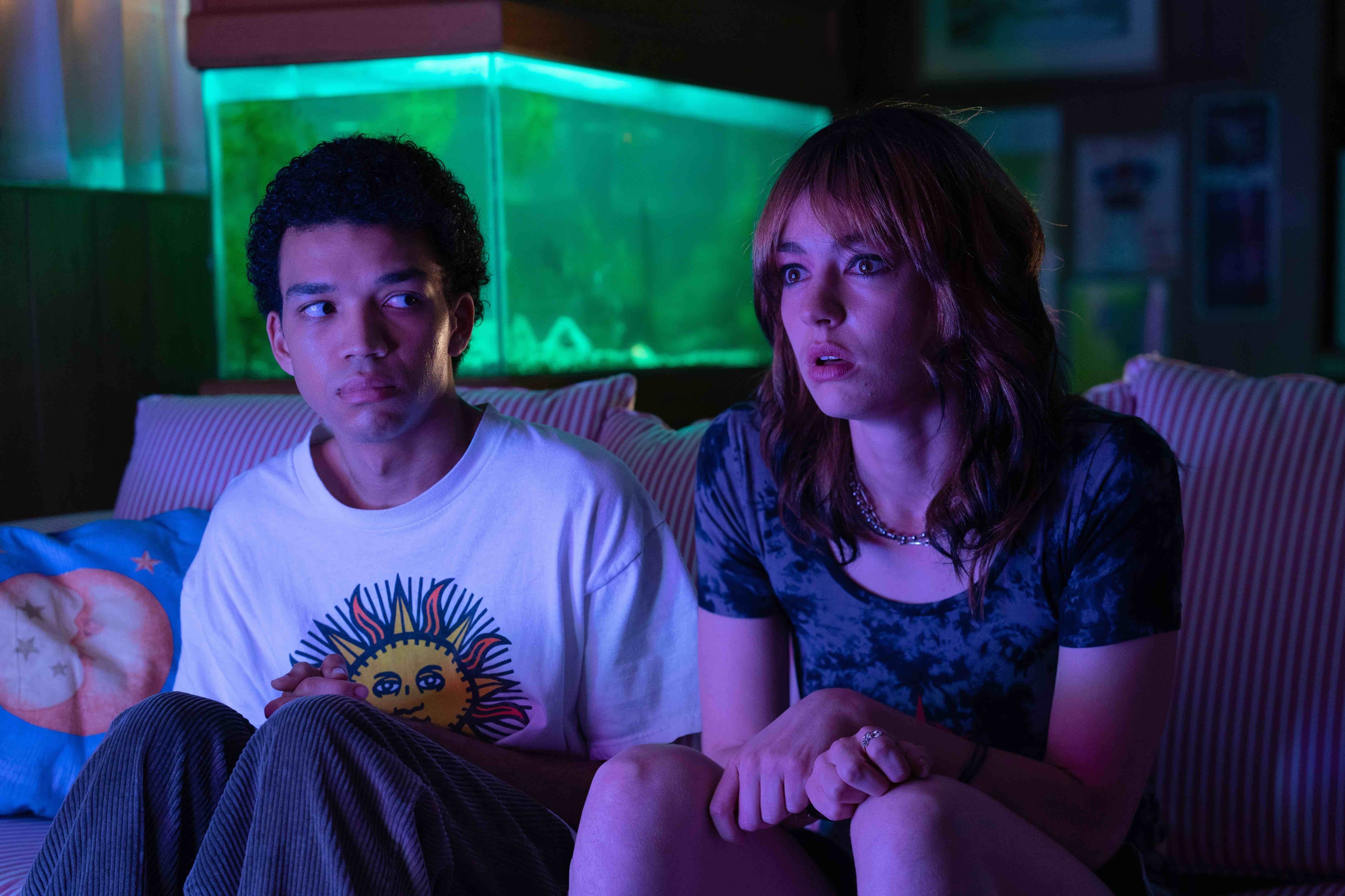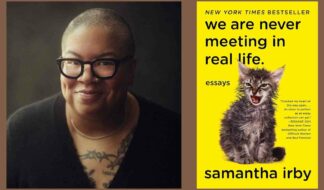‘I Saw the TV Glow’ Actor Justice Smith Talks Finding Refuge in Fandom and His Advice for Struggling Queer Youth
Smith's latest film, by trans writer-director Jane Schoenbrun, examines the 'safe shell' of deep pop-culture devotion

For struggling queer kids, pop culture can be a life-saving escape when faced with an unimaginable reality. This is true for two suburban teenagers who find themselves consumed by a supernatural TV series in “I Saw the TV Glow,” especially Owen, whose bedtime prevents him from catching episodes of his new obsession: the mysterious late-night show “The Pink Opaque.” But like any youth desperate enough to live in the fantasy of what could be, he finds a way to get what he desperately needs. His access to a world outside of his own is through cool, slightly older high schooler Maddy (Brigette Lundy-Paine).
Over the course of the film, Maddy and Owen, played by Ian Foreman as a kid and Justice Smith as a teenager, develop a close bond as they share an infatuation for what “The Pink Opaque” represents to them as they grow up and become adults. An homage to the ’90s with a sci-fi flair that resembles the work of David Lynch, “I Saw the TV Glow” premiered at the Sundance Film Festival earlier this year to acclaim, with AV Club praising the movie for being a “remarkable portrait of pop-culture obsession — how it can unite us, change us, and ripple down through our entire lives in ways both uplifting and unsettling.” A recent commentary on Polygon celebrated the film’s queerness, placing “I Saw the TV Glow” among other 2024 films that are “reshaping the possibilities of what a trans film looks like, and how transness can be expressed in cinema.”
The writer and director of “I Saw the TV Glow,” Jane Schoenbrun, who is trans, was acknowledged in the article for breaking new ground in the horror genre. “The directness of Schoenbrun’s usage of thematic and personal metaphors through the guise of horror is a classic storytelling device, but the way these ideas are communicated is startling, singular, and new territory for a mainstream horror picture,” the article notes. For Smith, whose wide-ranging résumé includes “Jurassic World: Fallen Kingdom” and Max’s queer teen series “Genera+ion,” he was immediately drawn to Schoenbrun’s vision. All he had to do was read the script.
How did the script initially speak to you as a queer person?
I had no idea what it meant. I really was like, "I don't get this at all and I have to do it," because it was just a vibe, and I had seen “We're All Going to the World's Fair,” and Jane has a way of making films that get under your skin, and it was on the page. I was like, "I feel this movie so deeply, even though I don’t understand it logically." That drew me to this. I'm really interested in doing unique, different stories that are shepherded by really eccentric minds. I feel like those are the creative voices we should hear from more often.
What appealed to you about Owen?
It was a character epic to me. It tracked this guy over 20, 30 years, and I was like, “That just seems so fun. There's just so much meat here that I feel like it will be really fun to play.” But obviously, on first read, I didn't know what it meant at all. I just was like, "Dope." And then when I had a meeting with Jane before I signed onto the film, Jane then kind of broke it down for me and I was like, "Oh my god, that makes so much sense. This is genius."
What was that conversation with Jane like and what clicked about her explanation of the film?
I could just tell that they had a really clear idea of what they wanted to make. To me, the story felt so ephemeral, and I couldn't conceptualize it, really. And I knew it would take somebody with a meticulous eye to bring every detail to life in order to read this overall picture. And talking to Jane, and seeing how smart they were, and also obviously, seeing their previous movie, I was like, "I feel like I can trust this person.
Once you realized how this film is partly about understanding who you are through pop culture and the need to escape into that world, did anything personal click with you and your own experiences?
When you are a marginalized person growing up specifically in a community that doesn't really see you, I feel like a lot of times we're drawn to representations in media, and that doesn't necessarily mean a character that has our same identities, but just a character who feels like us in some way. I think it offers a lot of solace and a lot of escape from the toxic environments that we live in. So I definitely identified with that.
Ever since I was a kid, I wanted to be an actor, and obviously it's because I enjoyed the pretend world more than the real world, and I was constantly looking for ways to escape. So I get Owen's obsession, and I get why he would go down this dark path of being so invested in this representation of himself. I think it's also safer to kind of tell your story through someone else’s. You talk about the pop culture thing you're obsessed with, and you're like, "Oh my god, on this week's episode, she had a fight with her parents, and she's just so misunderstood by them," and it's like a safe shell. It’s a safe way to let people into your inner world.

When you were younger, what was that “safe shell” for you?
There were a lot of movies and television shows. I mean, I was also a really big gamer. I play a lot of video games for hours and hours on end, but that was when I was really young. As I got older, it was acting, like it was plays and characters. And not to be too hippy-dippy about it, but that kind of was my escape. I was just always prepping monologues or trying to do scene analysis on something, and waiting until I got into class in order to perform, because that's kind of where all my pain went. That's where all my mess went, into my performance and into my characters. I still find that to this day. I find that whatever project I'm doing, or whatever character I'm doing, traditionally will mirror my real life, something that's going on in my real life that I can find catharsis in playing that character, because like, "Oh yeah, I know exactly how to filter my own issues into this thing."
Did you do some filtering in this movie?
For me, in this movie, what Owen was going through wasn't as black and white. For me, it was about letting go. That was a big lesson from this film. Because in previous projects, I put a lot of pressure on myself to be good and really try to listen to music and bridge this gap between me and the character. And with this, I was like, "What if I just trusted myself?" Especially because there was so much I had to track, I was like, "What if I just trust these words and I just trust that when Jane says action, it'll be there for me?" And surprisingly, it was. And so, it was a really profound lesson in showing up authentically, trusting that I had all the tools that I needed to give a meaningful performance and tell this story. It's about authenticity. And here I am, actually finding mine.
When you think of the polar opposite of this experience in which you had trouble trusting yourself, what project might that have been?
That's messy. [Laughs.] I'll answer it vaguely in the sense that, as a kid, I've already said acting was an escape for me. It really was a catharsis for me. And as it started to become a business and a job, slowly that started to infect my mind, and my approach to my work, and it became less magical and less fun. I remember there being a really pivotal moment that wasn't that long ago actually, where I was like, "I need to return to my original inner child's reason for doing this, because I'm not happy. I feel like I'm really obsessed with quality rather than my own actualization in this process," which when I got into this, that's all it was about. It wasn't about being a good actor, it was about, "How does this help me heal?" And so, I've been on a journey of returning to that, of just finding how I'm healing through each character I play or each story I tell.
It seems like you're really plugged into roles that have something to say about worldview and identity, and I wonder if what is happening in the world — a lot could be said about the attacks on queer people now — impacts the roles you decide to play?
I waver on this. For a moment, when I was really trying to find my purpose, and being an actor in the public eye, I was like, "Oh, maybe it's a representation thing. Maybe it's about fighting for communities that I love and I'm a part of." But I realized that that was another twisted way in which I put pressure on myself. It still led to my obsession with quality because I was like, "Oh, well, if I don't pick the right thing, or if I don't play the right thing, I will let people down." And it still was a way that I was motivating myself externally, versus finding my own internal drive to keep acting. And so selfishly, I concluded on my own, it’s really about me in my own healing, and I think indirectly that provides a lot of healing for my communities. And a lot of feedback I get from fans, people who watch my work, is something like, "It meant so much to me when you played Chester [on ‘Genera+ion’],” or that “you were public about your relationship.” When really, it sounds crass, I don't do it for them. I do it for me. It's a beautiful byproduct of me just trying to be as authentic as possible, and following my own gut and following my own heart. And it's not something that I'm like, "No, you guys can't identify with me.” If anything, I'm like, "That's beautiful."
In the film, Maddy and Owen are trying to find their place in the world, and there are so many young people in our community, especially right now, who are also trying to do the same. What advice would you give to LGBTQ+ youth struggling with acceptance who are going through the same things as these characters?
Although there's a twisted aspect to this film, I do think that there is a lot of comfort in finding yourself in media, especially if your environment isn't safe, and creating a really meaningful inner world, one that is safe, one that is comforting. But I think that if you live in an environment where you feel loved and protected, I know that being true to yourself is still scary, even in those environments. But your relationship with yourself is the longest relationship you're ever going to have, so your self-love is the most important love you're going to receive. So I think that when you get to a place where you can be like, "If I love myself, that is the most important," you'll be able to tell your truth and accept whatever people's reaction is to that.










